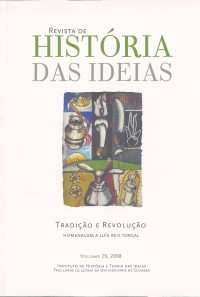Please use this identifier to cite or link to this item:
https://hdl.handle.net/10316.2/41578| Title: | Tradição e revolução: o discurso dos intelectuais brasileiros nos anos 20 e 30, do século XX, no Brasil | Other Titles: | Tradition and revolution: the discourse of Brazilian intellectuals in the 1920s and 1930s in Brazil | Authors: | Almeida, Maria das Graças Ataíde de | Issue Date: | 2008 | Publisher: | Imprensa da Universidade de Coimbra | Abstract: | O objetivo deste ensaio é desconstruir o discurso (Orlandi, 1995) intelectual
conservador no Brasil dos anos 20, e sua repercussão nos anos 30, expresso então,
através de um discurso que reifica a ordem, é contra revolucionário, conservador,
e refuta a idéia de revolução. Reflete o interdiscurso (Foucault, 1985) europeu,
que tem como fio condutor a reação às revoluções, ao liberalismo, apontado
como esteio para a implantação do comunismo. O corpus eleito como fonte para
este trabalho representa o discurso de intelectuais conservadores, ressaltando
entre estes, Jackson de Figueiredo e Alceu Amoroso Lima, que também usava o
pseudónimo de Tristão de Ataíde; procurando analisar as formas de produção
e os sentidos construídos por esta produção de discurso. A linha teórica se volta
para o imaginário social e político, a partir dos trabalhos de Girardet (1989)
Bazcko (1985) e Balandier (2001). A metodologia é a Análise de discurso (AD) na
linha francesa, que privilegia os sentidos construídos e as formas de produção
do discurso e o interdiscurso, ou seja, a memória discursiva, o que já foi dito
antes e é recuperado. The aim of this paper is to deconstruct the intellectual conservative discourse (Orlandi, 1995) of the 1920s in Brazil and its repercussion in the 1930s, expressed then through a discourse that reified order, was counter-revolutionary and conservative, and rejected the idea of revolution. It reflected the European interdiscourse (Foucault, 1985) that had as its guiding principle the reaction to revolutions and to liberalism, as the support to the establishment of communism. The corpus chosen for this study represents the discourse of intellectual conservatives, highlighting amongst these Jackson de Figueiredo and Alceu Amoroso Lima, who also used the pseudonym of Tristão de Ataíde. The paper seeks to analyse the forms of production and the meanings constructed by this discourse. The theoretical framework focuses on the social and political imaginary, based on the works of Girardet (1989) Bazcko (1985) and Balandier (2001). The methodology used is Discourse Analysis (DA) from the French school of thought that focuses on constructed meanings, forms of discourse production and interdiscourse, that is, discursive memory - the retrieval of that which has already been said. |
URI: | https://hdl.handle.net/10316.2/41578 | ISSN: | 0870-0958 2183-8925 (digital) |
DOI: | 10.14195/2183-8925_29_19 | Rights: | open access |
| Appears in Collections: | Revista de História das Ideias |
Files in This Item:
| File | Description | Size | Format | |
|---|---|---|---|---|
| tradicao_e_revolucao.pdf | 8.82 MB | Adobe PDF |  |
Items in DSpace are protected by copyright, with all rights reserved, unless otherwise indicated.
